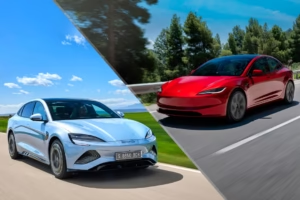In the world of eco-friendly SUVs, the epic showdown between the Honda CR-V Hybrid vs. Toyota RAV4 Hybrid stands out as a topic of endless debate. Both of these giants of the automotive world have presented their green solutions, each with its unique selling points. Let’s dissect their features, performance, and other quirks, shedding light on which might just earn the crown in this hybrid battle royale.
Both SUVs are stellar choices in the category, merging efficiency with style. While they share similarities in safety features and warranty coverage, the CR-V boasts better roadside assistance and a slightly larger cargo space. Meanwhile, the RAV4 stands out with its more dynamic performance and unique features. Pricing, infotainment, and design elements differ, but personal preferences will be the ultimate decider.
Plug-in Hybrids Have Been on a Steady Rise in the Automotive Market
High gas prices (as of 2023, the average retail price for regular gasoline in the US was $3.52 per gallon) – the common foe we all love to groan about. No matter where you point fingers, those numbers at the pump are skyrocketing and showing little mercy on our wallets. It’s enough to have many contemplating a switch to an electric vehicle (EV). Yet, for those not entirely set on going full-electric, those trusty plug-in hybrids (PHEV) are dancing back to center stage.
What’s undeniable is the momentum these partially electric four-wheelers have in the market. The most recent figures indicate that 346,309 EVs were sold in Q3 of 2024. And by 2028? We might be gazing at a staggering 5 billion units out on the road.
Toyota RAV4 vs. Honda CR-V – These Staple SUVs Have Earned Themselves a Hybrid Makeover
Considering the ever-evolving market, it’s no surprise that both of these legends of the automotive realm have tapped into the trend. Recognizing the shift towards sustainability, they’ve spruced up their beloved family SUVs with plug-in variants. Using less fuel is the ultimate goal, anyway.
However, that doesn’t mean you should expect a one-track offering. There are plenty of options to choose from, giving you the opportunity to truly select your next favorite ride. From the base to the bougie, there’s a trim level tailored for every eco-conscious driver out there.

Honda CR-V Hybrid vs. Toyota RAV4 Hybrid – The Battle of Sophisticated Flair and Off-Road Ruggedness
Peeling back the layers of these compact SUVs reveals contrasting souls executing a similar mission – giving you a comfortable and spacious ride along the famous US routes. Honda’s four-wheeler glows with a refined elegance, both inside and out, offering a drive that mirrors its polished look.
Its competitor, on the other hand, showcases a bolder, trail-ready flair in its stance, an essence it carries on and off the road. But at the end of the day, which style you’d prefer to gawk at inside your garage comes down to personal preference.
Honda’s Four-Wheeler Comes Fully Redesigned for the 2023 Model Year
Starting with our first contender, the 2023 model year introduces a new look that still feels familiar despite its comprehensive facelift. A more dominant grille emerges, flaunting a honeycomb-patterned mesh seen on other entries from this manufacturer. Other modifications might be subtler, but then again – if it ain’t broke, don’t fix it.
Toyota’s Ride Sticks With the Tweaks Made for the Previous Year but Uncovers a New Special Trim
Once known for its subtle, some would say bland, designs, the contending automaker has evidently pushed boundaries, making us turn heads at their evolved aesthetics. This SUV sticks with the 2022 model redesign, but it still radiates a brand-new, gritty aura. In this sense, it reminds us of its more rugged siblings, such as the impressive 4Runner.
What’s even more enticing is the introduction of the special Woodland Edition. This trim completely jazzes up the whole look – think two-toned paint jobs, shimmering bronze wheels, aggressive tires, and more.

Honda CR-V vs. Toyota RAV4 – Which One’s Got More Space to Offer for a Comfortable Ride?
When diving into the SUV market, space is definitely high on the wishlist for any potential buyer. Everyone’s chasing that dream of expansive legroom and generous cargo space for weekend getaways or those epic shopping hauls. In this department, our competitors are pretty comparable. But before we get into any more detail, here’s an overview of their dimensions:
| Measurement | 2023 CR-V | 2023 RAV4 |
| Length | 184.8 in | 180.9 in |
| Width | 73.5 in | 73 in |
| Height | 66.2 in | 67 in |
| Wheelbase | 106.3 in | 105.9 in |
| Ground Clearance | 7.8 in | 8.1 in |
| Seating Capacity | 5 | 5 |
| Cargo Capacity | 39.3 cu/ft | 37.6 cu/ft |
Both SUVs Offer Comfortable Seating for up to Five Passengers
Though there might be subtle differences on the spec sheet, in real-world scenarios, both vehicles hold their own in the comfort department. Whether you’re lounging up front or kicking back in the rear, both SUVs feel pretty roomy.
Honda’s SUV Has a Slight Advantage When It Comes to Cargo Capacity
Honda’s offering edges ahead slightly in the cargo game. This four-wheeler boasts 39.3 cu ft. (1,028 L) of room behind its rear seats and a generous 76.5 cu ft. (2,030 L) when you flatten that second row of seats.
On the other hand, Toyota’s entry provides just a tad less – 37.6 cu ft. (1,059 L) with seats in their upright position and 69.8 cu ft. (1,977 L) when they’re laid flat. However, a notable perk is its expansive rear hatch design. This hatch extends higher up, forming a clamshell-like opening, which is a dream when you’re trying to wriggle in that bulky bike or other hefty items.

Toyota RAV4 Hybrid vs. Honda CR-V Hybrid – Comparing the Standard Infotainment Features
In today’s digitally-driven age, infotainment features in vehicles are no longer just a perk – they’re absolutely essential. Whether it’s for connecting your devices seamlessly, accessing navigation with ease, or jamming to your favorite tunes, an infotainment system plays a pivotal role in enhancing the overall driving experience.
In this category, Toyota’s infotainment system might catch the eye with its flashy and contemporary layout. However, the deciding factor lies in the specific trim level you’re gravitating towards.
RAV4 Hybrid vs. CR-V Hybrid – Which Battery-Powered SUV Is the More Reliable Choice?
Safety is the number one driver’s responsibility, no matter what kind of four-wheeler you’re driving. However, it’s especially important when you’re choosing your next family ride. Luckily, both of our competitors come packed with a comprehensive range of safety features.
Think blind-spot monitoring paired with rear cross-traffic alerts, collision avoidance systems, lane assistance, and automatic headlight dimming. That being said, Toyota’s vehicle adds a cherry on top with its junction turn assist. This feature alerts drivers to approaching traffic during left turns – a great convenience that its contender doesn’t bring to the table.
Both Four-Wheelers Earned Pretty Good Ratings From Leading Safety Institutes
Of course, the suite of safety tech only paints part of the reliability picture – real assurance comes from crunching the crash-test data. The esteemed Insurance Institute for Highway Safety (IIHS) granted the RAV4 the distinguished Top Safety Pick, while its contender clinched the superior Top Safety Pick+ title.

CR-V Hybrid vs. RAV4 Hybrid – Performance, Driving, and Efficiency
When it comes to choosing that next set of wheels, here’s where the rubber meets the road. Performance, driving dynamics, and efficiency – the trifecta that drives most decisions. But before we get into any more detail, here’s a quick overview of the main specifications:
| Specification | 2023 CR-V | 2023 RAV4 |
| Type of Engine | 2L 4-cylinder hybrid | 2.5L 4-cylinder hybrid |
| Power | 190 hp at 6,000 rpm | 219 hp at 5,300 rpm |
| Torque | 179 lb/ft at 1,700 rpm | 221 lb/ft at 3,600 rpm |
| Drivetrain | Front-wheel drive (FWD) | All-wheel drive (AWD) |
| Transmission | Electrically variable speed (EVT) | Continuously variable speed (CVT) |
| Fuel Economy | 43/36/40 MPG | 41/38/40 MPG |
Now that the specs are out of the way, let’s take a closer look at a few important performance categories:
Engine Power
At the core of the Honda’s SUV lies a 2-liter four-cylinder engine, complemented by a duo of electric motors. Alone, the combustion engine delivers 145 horsepower and a torque of 138 lb/ft. Combine everything, and you’re looking at a robust 204 horsepower and 247 lb/ft. of torque, efficiently distributed to all corners via an e-CVT.
In the other corner, Toyota’s SUV boasts a meatier 2.5-liter four-cylinder engine, dishing out 176 horsepower. This powertrain, coupled with its electric allies, clocks a total punch of 219 horsepower – a tad more than its competitor.
Driving Experience
Differences in specs are one thing, but how they feel on the open road is another ball game. The more powerful of the two seems always ready for action, making maneuvering seem like child’s play, though not without its acoustic theatrics. Meanwhile, Honda’s engine plays it cool with a mellower note while running.
Each vehicle flexes its unique driving modes, striking a balance between zest and thrift. But it’s Toyota’s SUV that seems to have the upper hand in overall configuration. However, its competitor doesn’t lag too far behind, championing a smooth and sophisticated driving demeanor.
Fuel Economy
When it comes to efficiency, both SUVs are pretty much neck-and-neck. The Honda rolls out with a 43/36/40 MPG ratio, while the Toyota clocks in at 41/38/40 MPG. So, while one may shine a bit brighter in urban jungles and the other on open stretches, when it comes to average fuel consumption is essentially a tie.
Honda CR-V vs. RAV4 – What About Price and Value?
Both of these hybrids bring to the table a rich blend of features, performance, and efficiency, but how do they stack up when we peek at the price tags? Well, like in most categories we’ve covered, these four-wheelers are pretty close here as well. While it all comes down to the exact trim level you’re eyeing, it seems like Honda’s SUV comes out on top as the more affordable choice across the board. Here are the starting prices of the 2023 CR-V trim levels:
- LX – $28,410 MSRP,
- EX – $31,060 MSRP,
- Sport – $32,400 MSRP,
- EX-L – $33,710 MSRP,
- Sport Touring – $39,100 MSRP.
Now, let’s take a look at the 2023 RAV4 starting prices:
- LE – $30,725 MSRP,
- XLE – $32,235 MSRP,
- SE – $33,420 MSRP,
- Woodland Edition – $33,525 MSRP,
- XLE Premium – $35,125 MSRP,
- XSE – $36,385 MSRP,
- Limited – $39,030 MSRP.
RAV4 vs. CR-V – The Warranty Coverages Are the Same but Honda Offers Better Road Assistance
When diving into warranty specifics, both these SUVs march to a similar drumbeat, offering a basic 3-year/36,000-mile coverage and extending it to a 5-year/60,000-mile drivetrain warranty.
But when it comes to roadside assistance, the scales tip slightly. Honda’s SUV graciously steps up with a 3-year/36,000-mile assistance package, while its counterpart provides this aid for just 2 years. A small difference, perhaps, but for some, that extra year of peace of mind can make all the difference.

Final Verdict – Trusting Your Instincts and Personal Preferences
While specs, features, and reviews matter, sometimes it’s the personal touchpoints that truly make a difference. However, between hybrid and gas four-wheelers, the decision is clear. Now, besides the usage of the gas, each SUV has its standout attributes, but at the end of the day, it’s about how you feel behind the wheel and the experiences you envision on the road. The journey ahead is yours, and one of these hybrids is ready to make it unforgettable.








